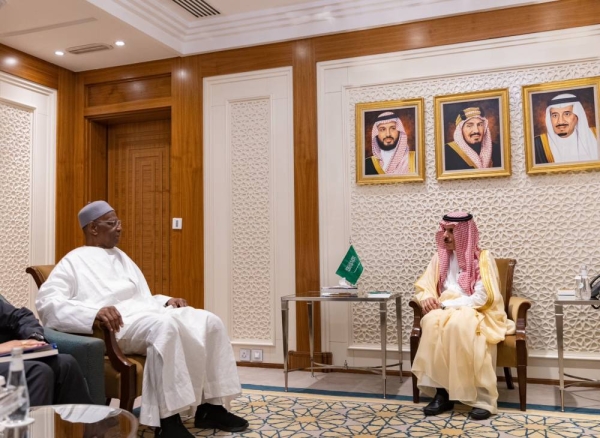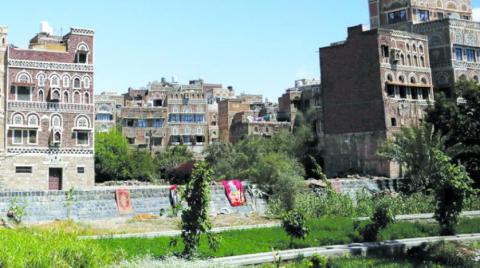
In the aftermath of the Berlin summit, the US source described Libyan National Army (LNA) leader Haftar as a decisive factor in the Libyan equation and stressed the need for the general to stop oil blockades
PARIS: The US has called for an immediate end to foreign intervention in Libya which was only “fueling the conflict” and undermining peace efforts.
A US State Department official told Arab News on Wednesday that external actors on the ground in Libya needed to stop stoking the situation and support UN special envoy to Libya, Ghassan Salame, in working toward a political solution to the fighting.
The American official said it was “crucial” that a UN Security Council resolution being discussed in New York was fully backed in order to help bring about a lasting cease-fire in the north African country where forces loyal to eastern-based commander Khalifa Haftar have been trying to take the capital, Tripoli.
In the aftermath of the Berlin summit, the US source described Libyan National Army (LNA) leader Haftar as a decisive factor in the Libyan equation and stressed the need for the general to stop oil blockades.
“A number of leaders who were in Berlin later violated the Berlin commitments. They had pledged to support the cease-fire, but some of them later backtracked and continued to fuel the conflict.
“The key here to us and to the UN, is if you don’t stop foreign intervention on the ground, you will never get to political conversations because you are always going to be fueling a conflict,” the official said.
“It is true that in Libya no one comes around a negotiating table, as they think they can achieve military victory so they can get an upper hand in a conflict. So, it is hard for us to try to bring them to a negotiating table. You have to have inducements.
“One of the key things in the particular case of Libya is removing the external support which would help speed up getting both of them — Haftar and Fayez Al-Sarraj, head of the Government of National Accord (GNA) — back to negotiations,” he added.
On French President Emmanuel Macron’s recent accusation that Turkish President Recep Tayyip Erdogan had violated the Berlin agreement by sending weapons and Syrian fighters to Libya, the official said: “Yes, the Turks have a hand in this, but it is not unique to them.
“Both sides are getting external help and we want to get the external supporters on both sides, on the GNA as well as on the LNA, to turn their support off to get people to the table quicker.
“If the external support is not available and is put on hold, the chances of putting people into negotiations is much higher because they are cut off from their ability to continue on the ground. It will be considerably reduced. I don’t want to say it will be eliminated.”
Meanwhile, Turkey has brought more than 4,000 foreign fighters into Tripoli, and that “dozens” of them are extremist-affiliated, according to militia leaders in Tripoli, quoted by The Associated Press.
The two commanders spoke on condition of anonymity because they were not authorized to discuss the matter with the media.
Syrian militants affiliated with groups such as Al-Qaeda and Daesh are currently being sent by Turkey to fight on behalf of the UN-supported administration in Libya, according to two Libyan militia leaders and a Syrian war monitor.
Both sides in Libya’s civil war receive equipment and backing from foreign countries. But Turkey, which has long trained and funded opposition fighters in Syria and relaxed its borders so foreign fighters joined Daesh, has in recent months been airlifting hundreds of them over to a new theater of war in Libya.
The Tripoli government controls only a shrinking area of western Libya, including the capital. It is facing a months-long offensive by forces loyal to Gen. Haftar who is allied with a rival government based in Libya’s east.
The commanders also highlighted differing opinions within the Libyan militias about accepting Syrian extremists into their ranks.
One said the fighters’ backgrounds are not important, as long as they have come to help defend the capital. The other said some commanders fear the fighters will “tarnish” the image of the Tripoli-based government.
Turkey-backed militias in northern Syria have been known to include fighters that previously fought with Al-Qaeda, Daesh and other militant groups, and have committed atrocities against Syrian Kurdish groups and civilians.
The UN has repeatedly condemned the flow of weapons and foreign fighters into Libya. But the organization has not directly responded to reports and accusations by Haftar’s side that Al-Sarraj’s government and Turkey are apparently using Daesh- and Al-Qaeda-linked extremists as mercenaries.
Turkey has not confirmed or denied reports of Syrian fighters being sent to Libya to support Sarraj, and the Turkish military did not respond to requests for comment.
However, in a televised interview last month, Turkish President Recep Tayyip Erdogan said: “As a combat force, we will have a different team there. They won’t be from within our soldiers. Those different teams and the combat forces will work together. But our high-ranking soldiers will coordinate.” He did not elaborate.
Rumors of Turkey-backed Syrian fighters in Libya have swirled for weeks. Foreign leaders and commentators have pointed to videos circulated online that appear to show Syrians in Tripoli.
In one video, a man with a Syrian accent films the dormitories where he and other fighters are living, saying “Thank God, we arrived safely in Libya.” Another clip shows a plane full of fighters, some wearing fatigues and speaking with Syrian accents.
Turkey’s Libyan allies and Syrian opposition leaders have denied any organized efforts to send combatants to Libya. But in January, Al-Sarraj told the BBC that his government “would not hesitate to cooperate with any party to defeat this aggression” by Haftar’s forces.
Rami Abdurrahman, the director of the Britain-based Syrian Observatory for Human Rights, told the AP that his war-monitoring network has determined there are at least 130 former Daesh or Al-Qaeda fighters among the approximately 4,700 Turkey-backed Syrian mercenaries sent to fight for Al-Sarraj.
He said the Daesh militants had joined the so-called Syrian National Army, a patchwork alliance formed by Turkey from different factions who battled the government of Syria’s Bashar Assad. Most of the groups are loyal to Turkey, and the SNA was used as shock troops last year in Turkey’s offensive against US-allied Kurdish forces in northern Syria.
In theory, a cease-fire brokered by Russia and Turkey remains in place around Tripoli but Libya’s warring sides have traded accusations of violations, and the shaky truce is threatened by clashes. Representatives from Al-Sarraj and Haftar began meetings in Geneva on Tuesday to work toward a more permanent cease-fire.
The Observatory also quoted a Syrian fighter from Idlib province who applied to go to Libya as saying he was motivated by the financial benefits offered by Turkey.
Elizabeth Tsurkov, a fellow at the US-based Foreign Policy Research Institute who closely follows Syria’s armed groups, said the promise of payment, Turkish citizenship or the prospect of fleeing to Europe were the main motives of Syrian fighters sent to Libya.
“None of them are committed to the fight in Libya due to personal conviction or ideology,” she said.
A Libyan official at the prime minister’s office said Syrian fighters have been in Libya since early August. At first, he said they were only facilitating the work of Turkish military experts. But as the fighting escalated in mid-December, the number of Syrian fighters arriving in Libya increased. These fighters now immediately deploy to the front lines, said the official, speaking on condition of anonymity because he wasn’t authorized to talk to reporters on the subject.
The Tripoli authorities and US officials have also accused Haftar of relying on hundreds of Russian mercenaries. Sudanese armed groups from the Darfur region recently joined the fighting on both sides, according to a report by UN experts.
The influx of Syrian, Russian and Sudanese mercenaries has threatened to prolong the war and cripple international efforts to establish a long-term cease-fire. Last month, a summit in Berlin brought together the major international stakeholders in Libya, but with few concrete results.
Nicholas Heras, a Syria expert at the Washington-based Institute for the Study of War, said Turkey is focusing on Libya to establish a sphere of influence in the Mediterranean.
“However, the Turks do not want to risk significant casualties to their own forces when the Turkish military has built a proxy force of Syrian fighters that can reinforce the Libyan fighters,” he said.










